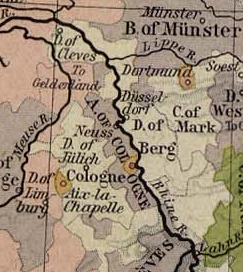สนธิสัญญาซันเติน
สนธิสัญญาซานเตน (เยอรมัน: Vertrag von Xanten, อังกฤษ: Treaty of Xanten) เป็นสนธิสัญญาที่ลงนามกันที่เมืองซานเตนในประเทศเยอรมนีปัจจุบันเมื่อวันที่ 12 พฤศจิกายน ค.ศ. 1614 ระหว่างวูล์ฟกัง วิลเฮล์ม เคานท์พาเลไทน์แห่งนอยบวร์ก (Wolfgang Wilhelm, Count Palatine of Neuburg) และ จอห์น ซิจิมุนด์ อีเล็คเตอร์แห่งบรานเดนบวร์ก (John Sigismund, Elector of Brandenburg) โดยมีผู้แทนจากอังกฤษ และ ฝรั่งเศสเป็นผู้ประสานการต่อรองของสนธิสัญญา
| เยอรมัน: Vertrag von Xanten | |
|---|---|
 แผนที่ของสหอาณาจักรดยุคแห่งยือลิค-คลีฟส์-แบร์ก ราวปี ค.ศ. 1477 | |
| วันลงนาม | 12 พฤศจิกายน ค.ศ. 1614 |
| ที่ลงนาม | ซานเตน, เยอรมนี |
| วันตรา | 12 พฤศจิกายน ค.ศ. 1614 |
| ผู้ลงนาม | 1. วูล์ฟกัง วิลเฮล์ม เคานท์พาเลไทน์แห่งนอยบวร์ก 2. จอห์น ซิจิมุนด์ อีเล็คเตอร์แห่งบรานเดนบวร์ก |
สนธิสัญญาเป็นการยุติสงครามสืบอาณาจักรยือลิค (War of the Jülich succession) ซึ่งเป็นสงครามชิงดินแดนที่เดิมเป็นสหอาณาจักรดยุคแห่งยือลิค-คลีฟส์-แบร์ก และความเป็นปฏิปักษ์ระหว่าง วูล์ฟกัง วิลเฮล์ม และ จอห์น ซิจิมุนด์ ตามสนธิสัญญาดินแดนอาณาจักรดยุคแห่งยือลิคและอาณาจักรดยุคแห่งแบร์ก และ ราเวนชไตน์ตกไปเป็นของวูล์ฟกัง วิลเฮล์ม และอาณาจักรเคานท์แห่งคลีฟส์ และ อาณาจักรเคานท์แห่งมาร์คตกไปเป็นของจอห์น ซิจิมุนด์ ดินแดนเหล่านี้เป็นจังหวัดไรน์จังหวัดแรกที่ตกมาอยู่ภายใต้การปกครองของราชวงศ์โฮเฮนโซลเลิร์น และเป็นดินแดนที่เก่าที่สุดของดินแดนที่ต่อมาเป็นไรน์แลนด์ปรัสเซีย (Prussian Rhineland)[1]
อ้างอิง
แก้- ↑ Hayden, p. 22. The other major problem in the [Holy Roman] Empire brings full circle the discussion of the Regency foreign policy. The two occupants of the Cleves-Jülich territory could not get along with each other. In the involved negotiations, the claimants changed religions and sought outside allies. The result was the threat of war in 1614 by the allies, the Dutch for Brandenburg and the Spanish for Neuberg. These two states, however, had no desire to break the truce of 1609, and after some feinting, negotiations opened which were assisted by England and France. The resulting Treaty of Xanten was signed on November 12, 1614, with Jülich and Berg going to Wolfgang William of Neuberg while Elector John Sigismund got Cleves, Mark, and Ravensburg. The Spanish army under Ambrogio Spinola refused to give up the key fortress of Wesel, and further negotiations were necessary, but in the end a shaky peace was maintained.
บรรณานุกรม
แก้- Hayden, Michael J. Continuity in the France of Henry IV and Louis XIII: French Foreign Policy, 1598-1615. Journal of Modern History, Vol. 45, No. 1 (March 1973), pp. 1-23.